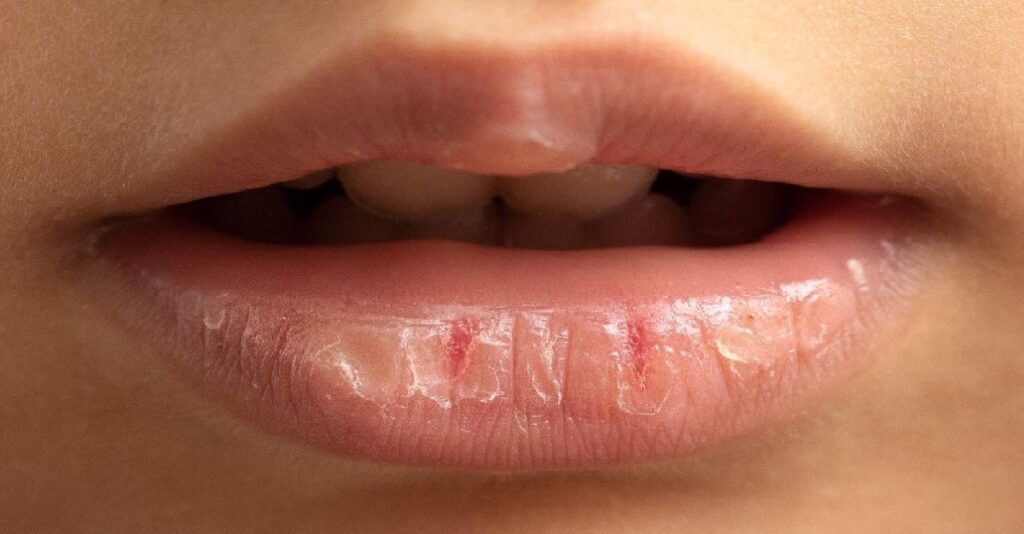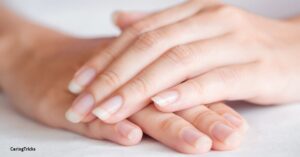What Should I Do for My Dry Lips?

Chapped lips are a condition of dryness, chapped on your lips that develops through exposure to the sun, freezing or dry weather, excessive lip-licking, or dehydration. Your lips are undoubtedly chapped if they hurt, burn, or otherwise feel painful.
Cheilitis, another name for chapped lips, is a chronic and unpleasant condition. Cheilitis, a more serious condition of chapped lips, can occur in certain persons. An illness known as cheilitis can manifest as broken skin around the edges of the lips.
You might believe that chapped lips are a wintertime condition. But regardless of the season, your lips can become dry, painful, and scaly if you don’t take extra care. This is particularly true if you often lick or bite your lip or use items that make your lips itchy and dry.
How widespread are chapped lips?
Anyone can develop chapped lips at any age. Lip chapped skin is more common in children and teens who frequently lick their lips. Lip licker’s dermatitis, a disorder that can cause chapped lips and a rash around the mouth, can also develop in them.
Lips that are chapped are prevalent among people who live in dried, hot climes or cold regions. Wintertime chapped lips are a regular occurrence for persons who have dry skin.
Lips being chapped due to:
Spicy or salty meals:
Spicy or salty foods will undoubtedly impact the skin there. Salt holds much water, therefore it may take the moisture from the lip and cause them to become dry. They may also cause skin irritation and water loss.
Lips burn in the sun:
The sun burns the hydration out of your skin, which can make it drier in regions that are already prone to dryness. Additionally, the inflammation brought on by a sunburn can cause your lips to peel as your skin tries to repair itself.
Constant exposure to dry air:
If you have chapped lips, it may be because you live in a region with low humidity all year round or are delicate to changes in moisture with the seasons. Dry lips may result from the air’s lack of moisture, especially during the winter.
Vitamin deficiency:
Several vitamin B shortages may cause dry, cracked, angry, or red lips. These symptoms are typically accompanied by a rash that resembles a rash from around the mouth. Lack of this vitamin results in dryness and hinders healing. It also aids your body system with cell development, healing, and turnover.
Chapped lips can also be caused by a vitamin C deficiency, but this is less common because most diets already include the necessary daily amount of vitamin C.
Dehydration:
The quick retention of skin’s cells on the lips makes you more susceptible to drying if you aren’t adequately hydrated. This can occur at any point of year, but it tends to happen more frequently in the winter because a dry conditioned environment can dehydrate your skin, including the skin on your lips.
Excessive lip-picking and licking:
When our lips are chapped, we tend to lick them and pick at the tiny parts of flaky, dry skin that remain. More moisture can be removed from the lips by tongue saliva, making them drier.
The skin of the lips is simply too thin to endure a battering. Additionally, it could result in long-term consequences including scarring or discoloration. Licking the lips might result in a loss of natural oils, particularly in the winter.
Medical condition:
Chapped lips can be caused by a variety of underlying medical conditions, including thyroid disease, vitamin insufficiency, and inflammatory bowel disease.
Lips that are dry or scaling are signs of chapped lips, also –
- Skin cracking.
- Skin peeling.
- Itching.
- Minor pain
- Infections in your mouth and on your lips.
What should I do if the bleeding from my chapped lips?
When the fissures in your lip break, they produce bleeding wounds and sores (split lip). The skin on your lips is prone to cracking, and if ignored, chapped lips can bleed, ache, and sting. An ointment made particularly for lips can be used to treat bleeding lips at home. Visit your doctor who may recommend more sophisticated therapy if the bleeding is persistent and home remedies are ineffective.
How may dry, chapped lips be softened or treated?
Lip balm is the most often used remedy for cracked or dry lips.
– Apply lip balm:
Sometimes chapped lips will go away by themselves but if that doesn’t happen within a day or two, consider using lip balm. Lip balms contain wax and oil components that work together to form a protective coating for the skin. A simple lip balm with a base of petroleum jelly or paraffin is the best option for you since it will keep your lips hydrated, protect them from the elements, and give them time to recuperate.
Shea butter, Lanolin, ceramides, Vitamin E, zinc oxide, and titanium dioxide are essential components for lip balms because they promote healing and restoration while preventing UV damage.
Your lip balm ought to be hypoallergenic and fragrance-free.
E.g. – Lotions, Oils, Moistening, Sun Blocking.
Avoid using lip balm with the following components since they might aggravate chapped lips:
Flavoring and fragrances, Menthol, Eucalyptus, Camphor, Waxes.
Stop using your lip balm if it gives a stinging, burning, or tingling feeling.
Apply often and early. Regardless of the product you select, apply it upfront rather than after applying lip gloss or lipstick. To keep your lips protected, reapply often. Use first thing in the morning, last of the night, and every couple hours during the day. You need roughly six to eight coats total over the day. Store a tube at your desk, one in the vehicle, one near the bed, one in your handbag, and a third in the desk to make this easy.
While lip products can undoubtedly be helpful, you can also get comfort from a wide range of treatments at home. Natural moisturizers can assist because the lips lack oil glands and are unable to create moisture on their own.
– Scrub your lips:
Sugar lip scrubs may be used to gently exfoliate this dry skin.
Look for lip scrubs that have substances that will soothe and moisturize the lips while buying them.
You can prepare your homemade lip scrub at home using supplies you already own. You’ll require
- 1 tablespoon of an exfoliating substance, such sugar or sea salt
- 1 tablespoon of an emollient, such oil or honey
- a little bowl or other mixing vessel
- To apply the scrub, use a cotton swab, and to remove it, use a moist washcloth.
To prepare the lip scrub:
- combine the moisturizer (oil or honey) and exfoliating component (salt or sugar) in a dish or other container.
- Squirt some scrub onto a cotton swab.
- Use little pressure to gently massage the scrub over your lips skin in a circular pattern.
- Use a wet towel to remove.
– Aloe Vera:
Aloe Vera plants produce this gel inside their leaves.
Damaged skin is calmed and rehydrated by the minerals, anti-inflammatories, antioxidants, and vitamins in it. You may use raw aloe vera from an aloe plant’s leaf or purchase organic aloe vera in a gel form. Cut a leaf off the plant-herb and slice it wide to scoop out the gel to accomplish this. When necessary, use your fingers to rub the gel to lips after storing it in a jar.
You should only use aloe Vera a couple of times a day because it has moderate exfoliating capabilities due to its enzymes.
– Cucumber:
It may include vitamins and minerals that might enhance the look of the lips and can gently hydrate the lips.
– Coconut oil:
Made from the meat of coconuts, this oil has anti-inflammatory, anti-microbial, and emollient characteristics, which means they help soothe and soften skin. It also has anti-microbial capabilities. Throughout the day, use coconut oil as required to chapped lips. Massage the oil to your lips with a finger or a cotton swab.
– Honey:
Because of its excellent moisturizing characteristics, honey is a good treatment for dry lips. Honey also has antibacterial and antioxidant characteristics that aid in preventing infections from growing on severely chapped or dry lips.
Apply natural honey on your lips with your fingers or a cotton ball throughout the day. Although honey is generally safe, those who are allergic to pollen or bee venom should stay away from honey and honey-related items.
– Avocado butter:
A review of research revealed that avocado butter functions well in lip balms as a lubricant and thickening. It isn’t oily and the skin readily absorbs it. It also has a number of fatty acids and antioxidants, including oleic and linoleic acid, that are recognised to be good for the skin.
– Green tea:
Green tea: Aside from being high in antioxidants and minerals, it also contains anti-inflammatory polyphenols. To soothe and remove extra dry skin from the lips, gently rub a bag of tea that has been soaked in warm water. This procedure is more sensitive than traditional exfoliation.
Methods to Avoid Chapped or dry lips:
- Try not to lick your lips. Sometimes people lick their lip to relieve the sensation of dry lips, but the saliva just makes things worse.
- Keep an eye on your lips. Apply lip balm as soon as they begin to look dry or irritated.
- Avoid spicy meals. Avoid spicy meals if you have delicate skin since they might irritate your lips.
- Drink plenty of water. Keep hydrated since dry lips indicate dehydration.
- Avoid using your lips to grip anything made of metal. Your lips may become irritated by paperclips, jewelry, and other commonplace metal items.
- At home, turn on the humidifier. If you inhale using your mouth at night, a humidifier in your room might be extremely beneficial.
- Sun damage: Prolonged sun exposure can harm the lips significantly, resulting in dryness and cracking.
In addition, actinic keratoses, a disorder that results in crusty lumps on the lips, can be brought on by sun exposure. It is best to get these lumps eliminated as soon as possible even if they are not life-threatening.
When should I visit a dermatologist?
In most cases, the self-care techniques mentioned above can treat cracked, dry lips in two to three weeks. Visit a dermatologist if it doesn’t.
Something other than dry weather may be at blame for your chapped lips. Your lips may feel dry and sore due to an allergic response, a yeast infection, and something more serious. A precancerous disorder called actinic cheilitis causes one or even both lips to become dry and scaly. A dermatologist with board certification can identify the reason.





